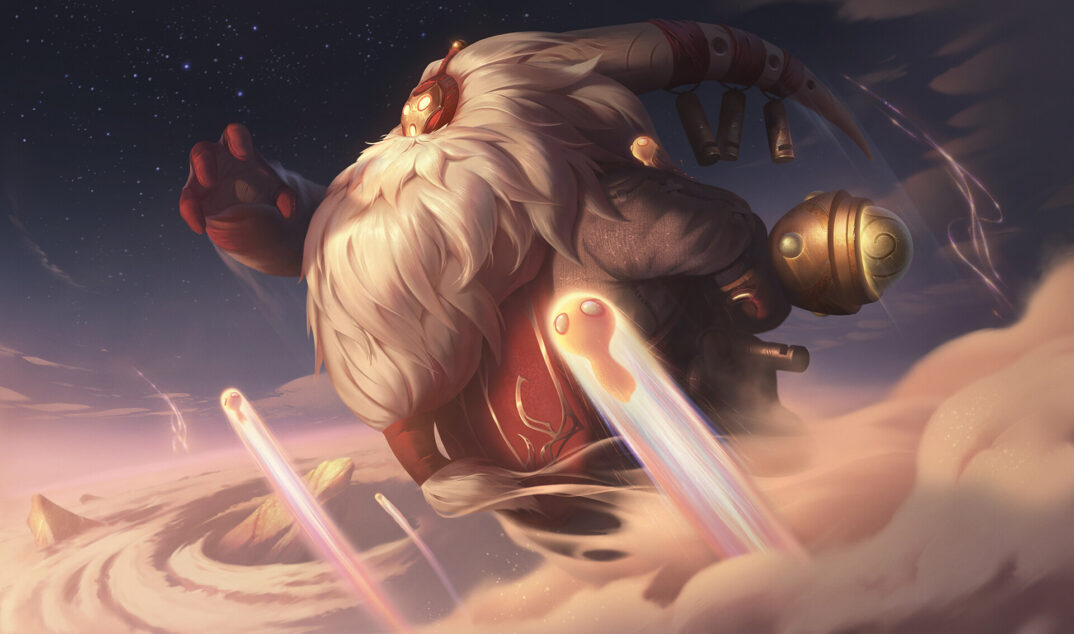The chimes sing.
They always do.
Bard floats above the Serene Dreamscape, his staff glowing with the light of a thousand stars, his robes shimmering like the void between galaxies. The air hums with the music of creation—a melody only he can fully hear. Below him, a fledgling star winks into existence, its light timid, uncertain. Bard smiles, his eyes crinkling at the edges. With a flick of his staff, he sends a chime spinning into the dark. The star brightens, emboldened, and joins the cosmic dance.
Long before the League of Legends, before mortals carved their wars into the fabric of Runeterra, Bard was a wanderer—a caretaker of life in its infinite forms. He was born of the First Song, the primordial harmony that shaped the universe. His duty: to nurture life, to mend the tears in reality, to remind the cosmos that even in chaos, there is beauty.
But the universe is vast, and Bard is… easily distracted.
He drifted from realm to realm, his pockets filled with chimes—fragments of forgotten magic. He collected them like souvenirs, each a memory of a life saved, a world preserved. On the moon of Ionia, he left a chime in the hollow of an ancient tree, its roots cradling the spirit of a dying forest. In the Freljord, he tossed one into a glacier, its song calming the wrath of a frost wyrm. He danced with constellations, bargained with leviathans, and once, on a whim, taught a shy yordle inventor how to harness the power of stardust.
But his greatest challenge came when he encountered the Void.
The Void was hunger—an endless, ravenous maw that devoured worlds. Bard watched as it consumed civilizations, its tendrils snuffing out stars. He tried to reason with it, to weave his chimes into its cacophony. The Void answered with silence.
So Bard fought.
He dueled Malzahar, the Prophet of the Void, in the ruins of a Shuriman temple. The man’s eyes burned with fanatical devotion, his voice a hymn to oblivion. “The Void is truth,” Malzahar hissed, summoning a rift. Bard’s reply was a chime that sealed the tear, its melody a counterpoint to the Void’s scream. “Truth is a lullaby,” he said, vanishing into the ether.
But the Void was relentless.
On the slopes of Mount Targon, Bard confronted the Watchers—primordial beings who sought to reshape existence. They sneered at his chimes, their voices like collapsing stars. “You cling to fleeting things,” they taunted. Bard merely smiled and placed a chime at the mountain’s peak. The ground trembled, and the Watchers retreated, wary of the song’s resonance.
The League of Legends offered Bard a respite. Here, he could intervene without directly interfering—guiding champions, nudging fate, and occasionally, stealing a pint of ale from a distracted yordle. He clashed with Jhin, the Virtuoso, whose obsession with perfection clashed with Bard’s chaotic harmony. “You are a flaw ,” Jhin spat, his gunshots precise, lethal. Bard pirouetted out of reach, a chime dissolving the bullets. “And you are a crescendo waiting to happen.”
But not all encounters were adversarial. He found kinship with Soraka, the Starchild, whose healing magic mirrored his own ethos. “You collect lives like they’re trinkets,” she teased, her voice a gentle breeze. Bard chuckled, tossing a chime into the air. “And you mend them like they’re constellations.”
His true rival, however, was Zoe, the Aspect of Twilight. The girl’s mischief knew no bounds, her pranks often unraveling Bard’s carefully laid plans. “You’re boring ,” she declared during one encounter, her portal spitting meteors. Bard deflected them with a wave of his staff. “And you’re predictable .”
Yet it was in the heart of the Shadow Isles that Bard’s story turned. He encountered Thresh, the Chain Warden, whose soul prison threatened to consume the spirits of the dead. Bard offered him a chime. “Even chains can sing,” he said. Thresh’s laughter was a storm of malice. “Your music is weakness.”
Bard left the chime floating in the void.
Now, as he drifts through the Howling Abyss, the chimes sing louder. The Void stirs, its hunger growing. Bard’s pockets are emptier than they’ve ever been—too many tears to mend, too many stars to save. He visits the places he once healed: the Ionia tree withered, the Freljord glacier cracked, the Shuriman temple reduced to dust.
The mortals call him a guardian. The summoners call him a trickster. But Bard knows the truth: he is a reminder .
On the Rift, he faces Vel’Koz, the Eye of the Void. The creature’s beam scorches the battlefield, its voice a dissonant screech. Bard dances through the assault, his chimes forming a symphony of light. “You cannot unmake what is already whole,” he says, a portal swallowing Vel’Koz’s attack.
In the end, Bard fights not for victory, nor for glory. He fights because the song demands it, because the universe deserves a encore.
And somewhere, in the silence between notes, he wonders if the chimes will ever run out.
The answer, like the stars, is written in the spaces between.
The chimes sing.
They always do.
Bard returns to the Serene Dreamscape, where a new star flickers—a mortal soul, lost between life and death. He places a chime in its light and watches as the star finds its place in the constellation.
The Void watches from the shadows, but Bard does not fear it.
He has a universe to save.
One chime at a time.

